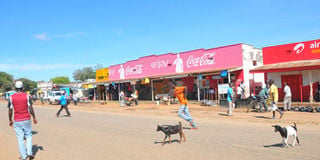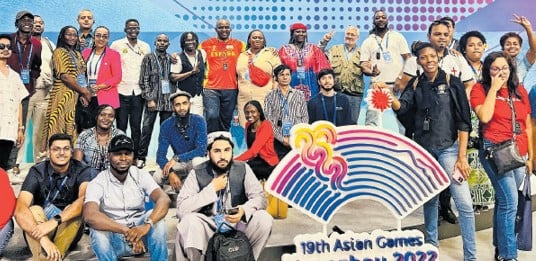Prime
Pakwach: The town that hosted the eclipse crowd

At the centre of Pakwach Town, business people open their businesses on the morning of the eclipse. Photo by Faiswal Kasirye.
What you need to know:
For days, it was in the news for having the best view of the hybrid solar eclipse. Today, we look at Pakwach’s history and how this phenomenon affected the area.
After kilometre upon kilometre of bush through Murchison Falls National Park, the steel structure of the Pakwach Bridge is a shock to the eye. It almost distracts from the river below, the Albert Nile, as well as the elephants grazing not so far away. It is also more than a promise of an oasis of modernity. The steel bridge is beautiful, imposing and iconic.
Which makes the first glimpse of the town as one emerges from the bridge almost disappointing. The police station is the first, with its cream brownish walls and black paint and open courtyard, a “photocopy” of any other police station around the country.
According to Chief Odong Padit Madhir III, Pakwach literally translates to the place where the leopard lives, named by the first inhabitant, Chief Puvungu who had to kill the animals before settling there. “Kwach is the Alur word for leopard. Even our emblem has the leopard in it,” says Chief Madhir.
The town is also tied in with the story of Nyabongo and Nyipir. Legend has it that the two brothers who were to later father the Acholi and the Alur tribes parted not far from Pakwach town, at Wang Lei.
Pakwach proper starts immediately after the police station and comprises of buildings on either side of the Gulu-Nebbi road. The buildings are of the simple, utilitarian type, set a respectful distance from the road and not more than three buildings deep from the road. Shops and eateries, bars and guest houses occupy these buildings. The tallest building seems to be a hotel –Windsor it is named— with its new windows gleaming in the sun. Its cream paint sticking out like a sore thumb.
Doesn’t sound like much right? Well it isn’t. Yet this was the place that hosted thousands of people just 10 days ago. People who came to view the eclipse from the vantage point, Owiny Primary School ,located 15 kilometres from Pakwach.
The few lodges ranging from the half decent ones with self-contained rooms and running water to fleabag places to only lay your head became dearer than gold around that time.
Enter the eclipse
Hiking the prices in Uganda shillings was not enough, they turned to dollars. It was an unbelievable windfall, accommodations which previously have a hard time finding clients (apparently many travellers do not stop in Pakwach preferring to drive the 50km to Nebbi for a rest) had several people contesting and the price was for the proprietor to name and for the desperate people to pay.
Business became brisk for those with restaurants. Fred Mugisha was running one of the busiest eateries Hope Family Hotel. It has been there for 30 years started by his father and ran by his mother when the former passed away. You can say the place and its proprietor has seen it all. But the last days of October were like nothing the restaurant had seen before. It does not matter that there was plenty of time to prepare.
“I had heard about the eclipse last year and had also learnt it would come to Owiny. We heard people were coming to Pakwach,” says the 24-year-old. About a month ago, he packed his bags and left Kampala where he has been studying to go help his mother at her restaurant.
He talks of Pakwach before the eclipse chasers descended on it. The most expensive plate of local food was going for Shs7,000. Before all this Shs5,000 could get you a meal and drink.
However, with the clientele that week resembling a United Nations gathering, prices were through the ceiling. Ordinarily, it is locals or travellers en route to Congo, Gulu, or Sudan or back to Kampala.
They were under no illusions either, fully aware that this boom was like the hybrid solar eclipse, a once in a lifetime opportunity, residents had risen to make the most of it.
At the peak of the event, prices were not much different from your fashionable coffee house prices in Kampala with handwritten or printed temporary menus not a rare sight.
“I am renting out my own room. I made Shs60,000 last night,” said Mugisha. Some ingenious woman had realised the selling potential of “rolex” and bought batches of wheat flour with eggs making the plainest “rolex” in the history of the Ugandan snack. But these were desperate times and people snapped them up.
Pakwach’s power problem came apparent at this time with the solar panels, which power most of the town being only good to keep the bulbs going.
Those with bigger establishments use fuel-powered generators or several large solar panels, but even these have their shortcomings. One stationery shop which is also a video library, an internet café of sorts as well as a charging centre had a generator that was programmed to go off at 9pm. At the lodge where we stayed, it went off at midnight and after that you had to grope in the dark to get around.
This makes the whole eclipse drama quite ironic. The one boom the town experiences for many years comes riding on a wave of people seeking to see darkness albeit for a few minutes. The very thing residents are spending millions to get out of.
“We have since given up that dream. Every year, there is a survey and promises that they will bring power. We thought this event would surely bring power but it has not,” says one Oscar Pacutho. He is an electrician who trained in Kampala but after futile attempts at getting a job he returned to Pakwach to run a stationery shop. He highlights the plight of Pakwach, which he feels does not change much or fast due to the lack of electricity.
“Big things need power. They need a lot of millions for enough solar panels that can provide enough voltage or even big generators,” he says.
He is among the ones who feel the eclipse brought little change to their lives. Maybe the restaurants sold more and those with accommodations had a field day, but for most of other residents, new faces, more people in the town for about a day and renovations on two roads is all the change they saw. “They were some new lodges around but they were made temporarily,” he says.
You would think being located at the edge of the national park would mean the town is used to playing host to tourists. Well, it is not. As Pacutho explains, it is only a spillover from the lodges in the park and the few that come to see the historical sites, mainly Wadelai, Emin Pasha’s last outpost.
The aftermath
The flood of humanity and the economic boom they came with begun to ebb almost as soon as the eclipse was done, with an exodus leaving the town, some for Kampala and others to the nearby towns probably in search of power.
Pakwach was left to count its profits, and they must have been massive, while others scrambled to a make a last minute coin. The young man at the “rolex” stand, who worked from Saturday morning to Sunday evening without a wink of sleep could close his business without feeling like he was missing out on so much. The lodges were scrambling for customers with prices plummeting. Places that were charging Shs90,000 for a single room came down to Shs40,000.
Mugisha thought it had ended too fast, he wished the eclipse happened more often and the best viewing point remained around Pakwach.
But others like Pacutho were not sad to see the visitors go. “My business has not really felt the change except a few more phones to charge. If anything, business is slower,” he said. His stationery shop relies on the residents coming to buy school supplies, but with all the excitement around the eclipse, few have ventured inside his shop.
“After all this, we will go back to the normal Pakwach,” he said on Sunday night. And to him this is being excited about things that happen in the town however small they may seem to others. Like the graduation coming up at the Uganda College of Commerce (UCC) located at the town’s edges. And also the things that make the town tick, the wooden crafts and fish.
Those are the very things one saw on Monday morning as the town returned to the usual. Students of UCC crossing the road. The craft sellers milling about the town, maybe hoping to make a last-minute sale to departing visitors, maybe it is what they do every day.
The market vendors had laid out their wares in the market space not far from the police station. The fish vendors of the famous Angara and Yellow fish laid out before them calmly waiting for buyers. Everyone going about their business like they have done so many times before the eclipse brought the world to their backyard.
===========================
The village of the eclipse
Its name is Otwii Kende and this is where Owiny Primary School, where the world gathered to view the eclipse, sits. Turns out it the name is an apt description of recent happenings. The LCI of the village of about 500 people, Chadwick Omvol Oweny, says Otwii Kende means something that came by itself. “Or something no one struggled to bring into existence,” he says. Like the eclipse don’t you think?
He is the one who also shares that the whole area up to Wadelai was the jurisdiction of one chief Sheikh Ali. “He welcomed the British and received the first delegation on February 4, 1894,” adds Oweny. Sheikh Ali had earlier welcomed the Arabs traders and had even converted to Islam hence the name.
The people
The residents of Otwii Kende village are descendants of that 19th century chief. He had 150 wives and 150 sons.Oweny says they never counted daughters in those days.
Because of their common descendant, the men of Otwii Kende do not marry from the same village.
For years, the residents have been subsistence farmers and fishermen. They have also sent their children to nearby Owiny school which was started by missionaries in the early years of the 20th century and was made of mud and grass thatch classrooms.
Facilities
Now, the school has brick walls, and ironsheet roofs but the residents still reside in the huts a lot like what their great grandfathers stayed in.
A few changes came as the area geared up to host the eclipse crowd, a borehole specifically, a fresh coat of paint for the classrooms and a monument in the playing field.
But the nearby health centre still has five beds and though the newly renovated road to Owiny led more people to the village than any other time in its history, it did not change the fact that the next day dawned on Otwii Kende hot as it has always been. Or that the locals would have to wake up and head to their farms as usual.




